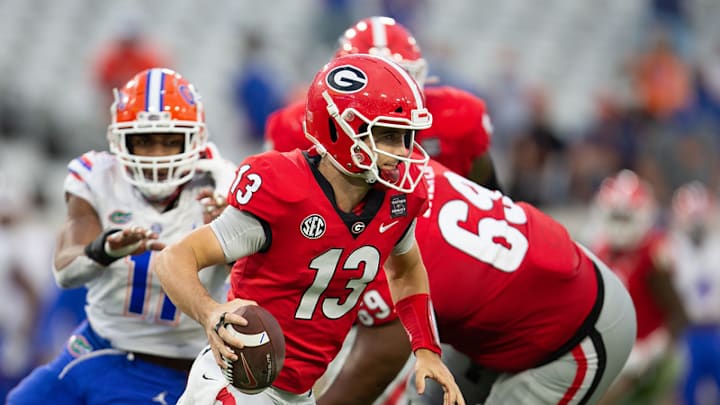Georgia Still Searching for Offensive Identity

Following the victory over Kentucky two Saturdays ago, it appeared the Georgia Bulldogs had figured out what they wanted to be as a football team: Run the ball and play solid defense.
That's precisely what the Dawgs did in their 14-3 victory over Kentucky. Georgia ran the ball 43 times for 215 yards. Defensively, they allowed only 229 yards of total offense and made Kentucky very one-dimensional with just 91 passing yards. It wasn't the prettiest win, but the Bulldogs did what they had to do.
They knew before the game they could run on Kentucky and stuck to that. An opening drive of 12 plays and 86 yards with one designed pass clearly showed those intentions. Most of the passes Stetson Bennett threw were behind the line or very short passes, netting around 9.4 yards per attempt.
It was very similar to what was seen last season with Jake Fromm and the offense. Georgia knew they wouldn't win a shootout. In 2019, the Bulldogs were 12-0 when their opponents scored less than 20 points. They were 0-2 when opponents scored more than 20. That was the Bulldogs' M.O. last year, and it worked when the offense did its job. Unfortunately, in the two games Georgia lost last year, it had six combined turnovers to none for its opponents. It was evident last year the Bulldogs had to grind at the line of scrimmage and play sound defense if they were going to win games.
It appeared that was going to be the case again this year, especially with a big question mark at the quarterback spot. However, that has not been the case. Despite the heavy run game against Kentucky, the Bulldogs have played very differently than expected. That is illustrated by a look at the pass attempts in the first six games:
- Arkansas: 47
- Auburn: 28
- Tennessee: 27
- Alabama: 40
- Kentucky: 14
- Florida: 29
The pass-attempt numbers have gone up and down like a roller coaster. To even the average eye, it's easy to see that the offensive weakness has been the quarterback position. This team's strong point is to run the ball, play good defense and control the game. Georgia made the mistake of trying to keep up with Alabama's offense a few weeks ago when offensive coordinator Todd Monken elected to run the ball three times after Alabama took the lead late in the third quarter. They abandoned the run as soon as they fell behind. Why abandon a prolific run offense as soon as the other team takes the lead?
Fast forward a few weeks later to Florida. The Bulldogs scored on the game's first play, a 75-yard outside sweep by running back Zamir White. Georgia then forced a three-and-out on the next defensive possession and scored again on a Stetson Bennett touchdown pass to take a 14-0 lead within the first four minutes of the game.
It could be assumed that an offense which averaged 175 rushing yards per game would try its best to milk the clock and slow the game down because of Florida's prolific offense. However, after White's first touch that resulted in a touchdown, he had just two carries for the rest of the first half and finished the game with seven total carries.
The Bulldogs ended up running the ball only 15 times with their running backs against Florida. It was 29 overall including seven from quarterback D'wan Mathis, three from Bennett, two from wide receiver Jermaine Burton and two credited team attempts). They still managed to run the ball for 165 yards. Collectively, Mathis and Bennett were 9-for-29 passing with three interceptions. What happened to running the ball 43 times against Kentucky?
Head coach Kirby Smart told the media the entire week leading up to the matchup with Kentucky that Georgia needed to "get back to their identity," which has historically been a run-heavy offense. They proceeded to run the ball on 75.4 percent of their offensive plays.
However, the groundwork the Bulldogs laid down against Kentucky did not carry over to the Florida game, and it likely cost them the SEC East this year. Why change the approach for the most important game of the year? It's almost as if there were two completely different teams in two weeks. It's evident that Monken does not have a quarterback for the type of offense he likes to run, but shouldn't lead to forcing it when there is talent everywhere else on offense. It is now clear that the quarterback position is a legit problem, so it will be interesting to see how this team plays moving forward, considering its playoff hopes are probably crushed.
